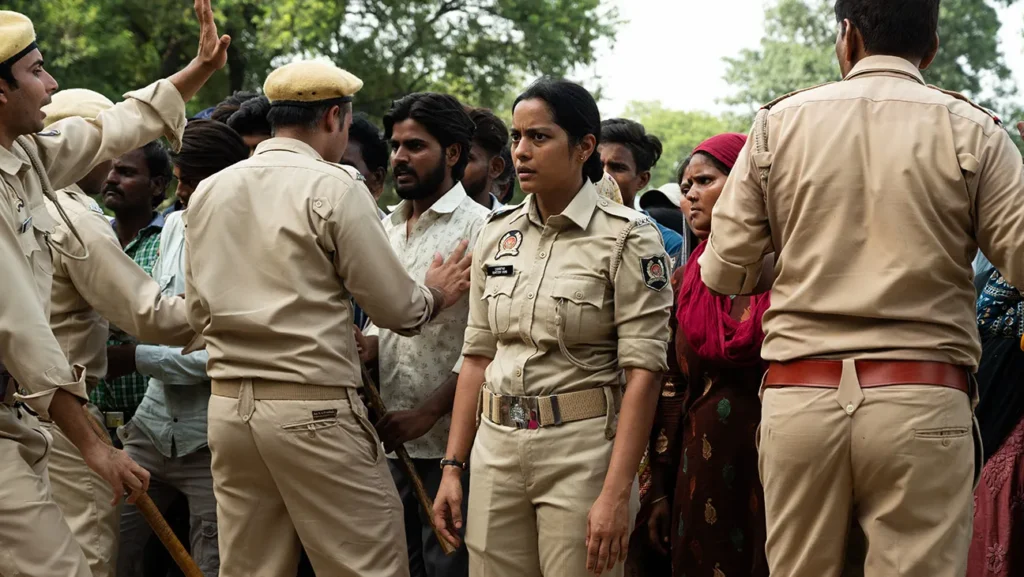
Cinema has its ways of glamorizing professions for what they are not. The conditioning is such that an alpha man or a woman must be a cop, a lawyer, a gangster, or a similar smart cookie. If they engage in unclogging, it better be the metaphoric dirt in society. In a paradox, I remember getting startled by Cassey Affleck’s Oscar-winning janitor act in Manchester by The Sea. Filmmaker Sandhya Suri’s first full-length fiction feature Santosh is amusing for similar reasons. The leading woman joins the police force through a government scheme rather than out of passion. In a job famously advertised as powerful, the mild-mannered woman struggles to find her ground.
Santosh (Shahana Goswami) lives in rural India, designed to resemble Uttar Pradesh. She lost her husband, a former police constable, in a communal riot. The woman needs closure on how it unfolded but, call it a consolation, she has a government job on a platter. Santosh cannot be a dialogue-blazing Shivani Shivaji Roy (Rani Mukerji’s super-fun screen cop). She would have rather cooked, cleaned, and raised children if she had a way.
Suri’s film establishes how corruption works hand in hand with vices such as casteism and gender bias in India’s government setups. Speaking of the former, the fifty-rupee bill that you insert into an underpaid office worker’s shirt pocket is something they fervently believe they deserve. To illustrate this idea of normalcy, the film takes us alongside patrolling cops who “maintain” the decorum of society by policing young couples in a park. Santosh stands confused as her colleague takes pleasure in the imaginary high ground, reveling in the sense of power it seems to grant her. Suri subsequently deep-dives into graver issues by analyzing the system’s incongruences through the protagonist’s morality.
In her first assignment, Santosh is seen guarding a Dalit girl’s corpse and not fashionably firing bullets in an over-coloured Rohit Shetty film. The plot takes a communal turn when a young Muslim man’s text messages to the deceased girl come to light. The investigation takes her to meet top cop Geeta Sharma (Sunita Rajwar) who appears to take the rookie cop under her wings. Is there an ulterior motive behind Geeta’s benevolence?
ALSO READ: ‘Flow’ review – Animals become unlikely friends in Latvia’s animated masterpiece
In exploring the internal journey of her protagonist, Santosh never delves deep into the woman’s relationship with her slain husband. In a heartbreaking moment, she insists on an apology for the man’s death from the accused in the ongoing case. My only concern with the film’s portrayal of the latter lies in his suspicious behavior. Was he anxious about his religious identity being exposed, or was there another underlying reason?
Among other devices it employs, Santosh is a stunningly quiet police procedural. Instead of delivering a one-liner at the top of her voice, its leading lady sighs and gasps through unforeseen events and new surroundings. Shahana Goswami, in the titular part, lends empathy and heart to a woman whose journey is difficult to put into words. The woman’s truth might contradict each other in the different roles she plays. As a sheltered housewife, she probably wouldn’t have had the experiences she has as a minor cog in a faulty system. This way, Suri’s writing gives a familiar heroine the much-needed emotional wattage. DOP Lennert Hillege further accentuates the impact with frames and lighting that steer clear of gloss. Maxime Pozzi-Garcia’s editing masterfully captures the dreariness in the air, crafting a gripping narrative.
Sunita Rajwar’s portrayal of Geeta is equally compelling. While the actor is undeniably strong in her performance, it’s Suri’s nuanced character sketch, filled with ambiguities and moral complexities, that brings us closer to the woman. Geeta may not be the well-wisher or guiding light Santosh deserves, and we realize this at some point. Yet, despite her flaws, we never truly hate her for doing the best she can.
For a name that translates to happiness in Indian languages, Santosh’s heroine is anything but that. The perplexed woman’s existence in a corrupt, exclusionary, misogynistic, and bigoted world with a rigid power structure is a gentle critique of how life in developing nations. The rich get richer, the poor turn poorer and everyone else is left huffing for air. Shahana Goswami’s film does not make us miss how it refuses to celebrate the woman it chronicles. Instead, it gives her depth and a beating heart.
Rating: ★★★★
Santosh was watched on a private FYC Screener ahead of the awards season. United Kingdom’s official entry to the 97th Academy Awards, the film has made it into the Top 15 shortlist and is slated to release in India in January 2025.

